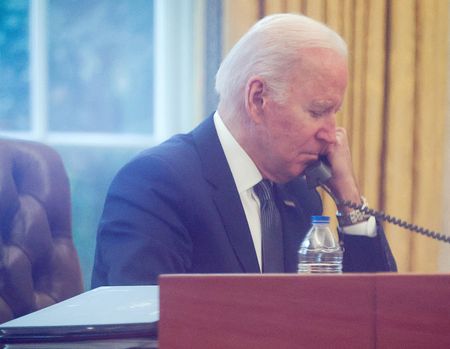
Analysis-U.S. rallies a united front against Russia as Putin seeks cracks

By Simon Lewis
WASHINGTON (Reuters) – A week of diplomacy by U.S. President Joe Biden failed to defuse tensions between Russia and Ukraine, but has maintained unity with European allies against Moscow as Russian President Vladimir Putin seeks to expose cracks, foreign policy analysts say.
After former U.S. President Donald Trump openly disparaged NATO and left Europe questioning Washington’s commitment to the alliance, some analysts said Putin appeared to be testing Biden’s declaration that “America is back” on the world stage.
“He’s probably counting on divisions in the West,” veteran former U.S. diplomat Daniel Fried, who worked on the response to Russia’s seizure of Crimea in 2014, said of Putin. “He’s going to keep pushing and things could get worse. But had we caved (this week), it would be much worse.”
Russia did not walk out of meetings with the United States and European nations this week, but the talks ended with U.S. officials warning that the risk of a Russian invasion of Ukraine remains high with no sign that Moscow will return some 100,000 troops near the Ukrainian border to their barracks.
Russia denies it plans to attack Ukraine but says it could take unspecified military action unless its demands – including a promise by the NATO alliance never to admit Ukraine – are met.
Biden took office in January 2021 calling for “predictable” ties with Russia and playing down Moscow’s global influence.
“There has been a systematic underestimation (in Washington) of the ability of Russia to disrupt things,” said Tom Schwartz, a professor of history, political science and European studies at Vanderbilt University.
But Putin flexed his muscles, moving troops and military hardware close to Russia’s border with Ukraine over the past year and prompting intensified U.S. diplomacy with Moscow.
Putin would not let himself “be deprioritized” by Washington, said Schwartz, adding that the Russian leader was attempting to demonstrate that “the American-led international order is really quite fragile now. It’s a testing moment.”
Biden’s bid to rebuild U.S. leadership globally was also hindered by a chaotic withdrawal of U.S. troops from Afghanistan in August that prompted the European Union to consider ways to become more independent of the U.S. military.
‘ALL IN THIS TOGETHER’
When asked if the Biden administration was faced with any kind of Trump hangover among NATO allies, a senior U.S. official, speaking on condition of anonymity, said there was no “lack of unity or confidence among NATO allies.”
“We are all in this together and they’ve responded very well to the administration’s approach, which is definitely nothing about Europe, without Europe, nothing about NATO, without NATO,” the official said.
Biden has faced lingering doubts about America’s reliability as a partner. Leaders from the Group of Seven advanced economies, NATO and the European Union are worried about the pendulum of U.S. politics swinging yet again.
While in office Trump threatened to withdraw from NATO and accused Europeans of contributing too little to their defense.
Although Biden pledged to continue giving military aid to Ukraine and to boost support if Russia invades, Washington’s response has been almost entirely diplomatic, and the West is not in a position to defend Ukraine militarily.
The main attempt to deter a Russian invasion is a U.S. threat of “unprecedented” sanctions, including export controls and measures targeting Russia’s financial system.
U.S. officials have spent weeks trying to ensure Europe would match Washington’s planned sanctions response, but no clear agreement has been reached on what specific sanctions will be leveled.
While the European Union imposed sanctions on Russia when it annexed Ukraine’s Crimea in 2014, the bloc has shown divisions over how to deal with Moscow, which accounts for one-third of EU gas imports.
The United States said Moscow’s behavior towards Ukraine will play a crucial role in the fate of the Nord Stream 2 pipeline, meant to transport natural gas from Russia to Germany. But Germany on Thursday warned against drawing a link between the pipeline and the Russian tensions.
“I think the Europeans would be united behind serious sanctions in the event of a full-scale Russian invasion,” said Anatol Lieven, senior research fellow at the Quincy Institute for Responsible Statecraft.
“If it’s something short of (invasion) – one has to remember that America does not depend on Russia for gas; Europe does,” Lieven said.

















POST COMMENTS (0)